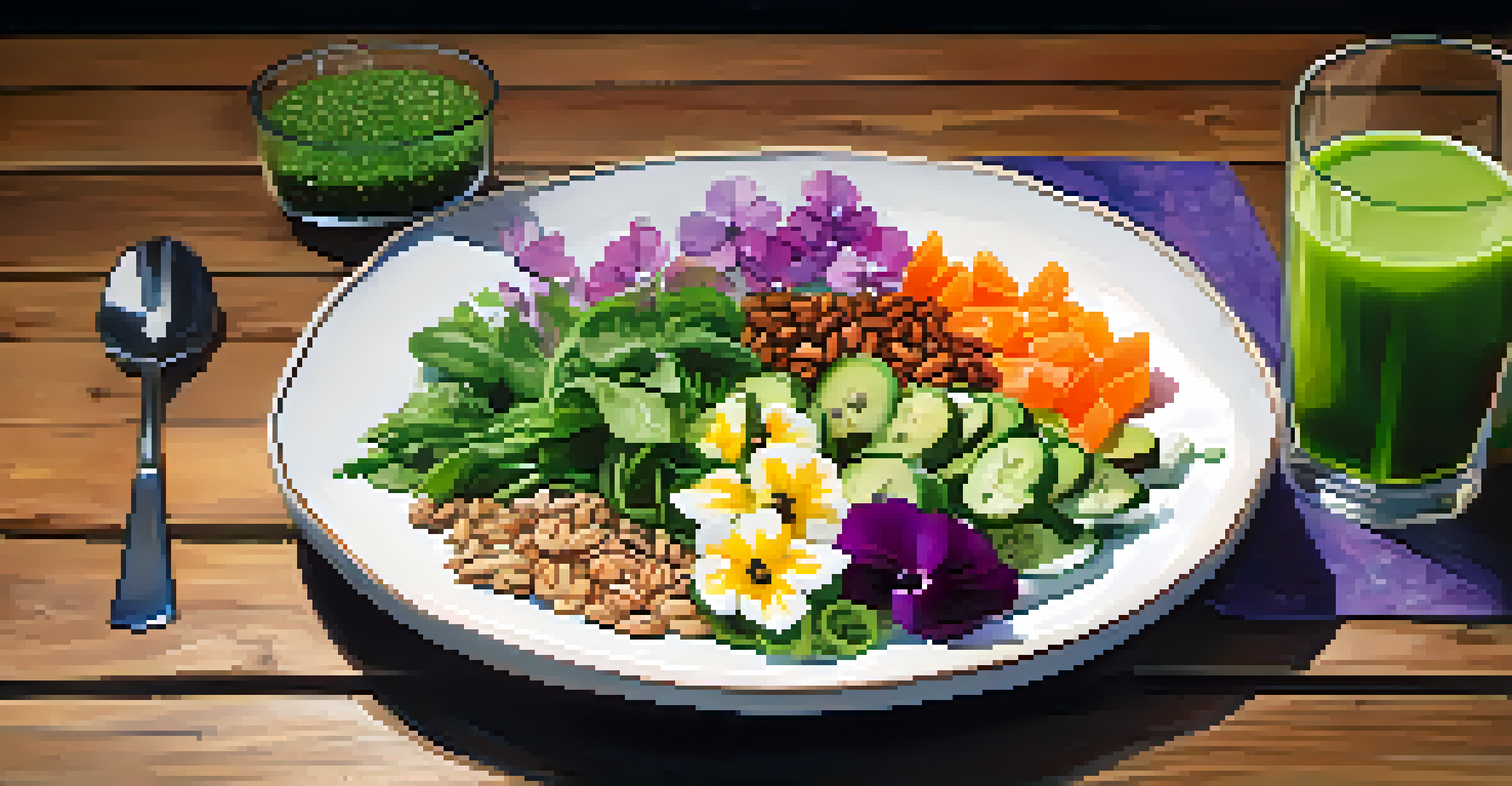Cultural Perspectives on Raw Food Diets and Their Ethics

Understanding Raw Food Diets Across Cultures
The raw food diet, which emphasizes unprocessed and uncooked foods, varies significantly across cultures. In some communities, this diet is deeply tied to traditional practices and beliefs about health and wellness. For instance, many indigenous cultures have long valued raw foods for their nutritional benefits and connection to the earth.
Let food be thy medicine and medicine be thy food.
In contrast, modern interpretations of raw food diets often merge with contemporary lifestyle trends, promoting ideas of detoxification and holistic health. This fusion can sometimes overshadow the original cultural significance, leading to a more commercialized view of raw eating. As a result, understanding these cultural roots is essential to appreciate the diversity of raw food practices.
Moreover, raw food diets are not universally embraced; some cultures prioritize cooked foods for their flavor and digestibility. This highlights the rich tapestry of food practices around the world, where beliefs about health, tradition, and community shape dietary choices.
The Ethical Implications of Eating Raw Foods
Eating raw foods raises intriguing ethical questions about food sourcing and sustainability. Advocates argue that raw diets promote a more natural way of eating, which can be less damaging to the environment. They emphasize that by consuming unprocessed foods, individuals may reduce their carbon footprint and support local agriculture.

However, the ethics of a raw food diet can be complex, especially when considering food waste and accessibility. For example, a strict raw food diet can lead to high food waste if fruits and vegetables are discarded due to blemishes or imperfections. Additionally, not everyone has equal access to fresh, quality produce, raising concerns about food justice.
Cultural Roots of Raw Diets
Raw food diets are deeply intertwined with cultural beliefs and practices, influencing how different communities perceive health and nutrition.
Balancing the desire for ethical eating with practical realities is crucial. It’s essential to consider how cultural values influence food choices and the ethical implications of those choices, fostering a more inclusive conversation around diet and sustainability.
Cultural Beliefs Supporting Raw Food Diets
Many cultures believe that raw foods preserve vital nutrients and life force, which are diminished through cooking. For example, in Ayurveda, a traditional Indian system of medicine, raw foods are often seen as energizing and pure. This belief underscores a holistic view of health where food is not just sustenance but a source of vitality.
The food you eat can either be the safest and most powerful form of medicine or the slowest form of poison.
Similarly, the Japanese concept of 'ichiju-sansai,' which emphasizes balanced meals often incorporating raw components, reflects a deep respect for natural flavors and seasonal ingredients. This perspective links food preparation to cultural identity and the appreciation of nature's bounty.
These cultural beliefs not only support the raw food diet but also highlight how food practices can be intertwined with spiritual and health philosophies. Understanding these perspectives can help broaden the discussion about the benefits and challenges of raw eating.
Health Perspectives on Raw Food Diets
Proponents of raw food diets often tout numerous health benefits, including improved digestion, weight loss, and increased energy levels. They argue that uncooked foods retain enzymes and nutrients that are vital for optimal health. This claim has gained traction in wellness circles and has inspired many to adopt a raw lifestyle.
However, nutritionists caution that raw diets may not provide all necessary nutrients, particularly vitamins B12 and D, which are primarily found in animal products. This nutritional gap can lead to deficiencies if the diet is not carefully planned. Therefore, understanding the importance of balanced nutrition is crucial for anyone considering a raw food approach.
Ethics and Sustainability Issues
The ethical implications of raw food diets raise concerns about food sourcing, waste, and accessibility, highlighting the need for a balanced approach.
Ultimately, while raw foods can be a part of a healthy diet, moderation and variety should be prioritized. Each individual's nutritional needs will vary, and it’s essential to consider personal health conditions and lifestyle when deciding on dietary practices.
Raw Food Diets in Modern Western Culture
In modern Western culture, the raw food movement has gained momentum, often associated with health trends and lifestyle brands. Many people are drawn to the idea of eating fresh, unprocessed foods as a way to detoxify and rejuvenate their bodies. This appeal has led to the proliferation of raw food cafes and cookbooks.
However, this trend can sometimes overshadow the cultural significance of raw eating in various traditions, reducing it to a mere fad. The commercialization of raw foods often prioritizes aesthetics and marketability over authentic cultural practices, raising questions about the integrity of these diets.
As consumers navigate this landscape, it’s vital to seek out authentic sources and understand the roots of raw food practices. This approach fosters a deeper appreciation for the diverse cultural narratives surrounding raw eating, moving beyond surface-level trends.
Challenges in Adopting a Raw Food Diet
Adopting a raw food diet can present various challenges, from social stigma to practical difficulties in meal preparation. Many people find it hard to maintain a raw food lifestyle, especially in social situations where cooked foods dominate. This can create feelings of isolation or pressure to conform to more traditional eating habits.
Additionally, the time and effort required for planning and preparing raw meals can be daunting. Without proper knowledge and skills, individuals may struggle to create balanced and satisfying meals, leading to frustration and potential abandonment of the diet.
Challenges of Raw Food Adoption
Adopting a raw food diet can be challenging due to social stigma and practical difficulties, necessitating support and education for sustainability.
Recognizing these challenges is crucial for anyone considering a raw food diet. Support systems, educational resources, and a flexible mindset can help individuals navigate the transition, making the journey more enjoyable and sustainable.
Future of Raw Food Diets in Global Context
Looking ahead, the future of raw food diets will likely continue to evolve as global food cultures intertwine. As more people become aware of the benefits of plant-based eating, raw foods may find a more prominent place on dinner tables worldwide. This shift could lead to greater innovation in raw food preparation and education.
However, it’s essential to approach this evolution with sensitivity to cultural origins. As raw food practices become more mainstream, there’s a risk of appropriating cultural traditions without proper understanding or respect. Striking a balance between celebration and appropriation will be key in fostering a respectful dialogue.

Ultimately, the future of raw food diets will depend on our ability to appreciate the rich tapestry of cultural perspectives while promoting ethical practices. By embracing diversity and inclusivity, we can create a more holistic understanding of raw foods and their place in our diets.